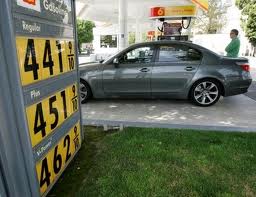 Across the nation drivers are feeling the squeeze at the fuel pump. But imagine how fleet operators must feel. These are people whose job and income depends on operating a fleet of vehicles.
Across the nation drivers are feeling the squeeze at the fuel pump. But imagine how fleet operators must feel. These are people whose job and income depends on operating a fleet of vehicles.
Gasoline prices have risen substantially in recent weeks. The current national average price for a gallon of regular self-serve gasoline is $3.92.
This price is three cents more expensive than one week ago, 17 cents more expensive than one month ago, and 28 cents more expensive than one year ago.
Robert Crawley, owner of Robert’s Coffee and Vending Service in Longview, TX, told the Longview News Journal his firm operates a fleet of about 20 delivery trucks and service vehicles.
Crawley said, “compared to this time last year we’re spending about $500 more a week on gasoline. So far, we’ve absorbed the expense and haven’t had to pass it along to our customers.”
But, he said, if the price of fuel for his vehicles continues to rise and stays at inflated levels for an extended period of time he expects that extra expense to be added to the cost of goods and services for his customers. Crawley said he does expect to trim expenses by dropping some accounts that are not profitable or are only marginally profitable to service.
“We may drop some of our smaller accounts,” he said of actions planned soon to counter the rising fuel cost. “We can’t afford to pay drivers, keep the trucks on the road and pay for gas too for some of the smaller accounts — it’s just cost prohibitive.”
High Gas Prices Driving Fleet Tracking System Sales
Fleet tracking system sales appear to be increasing this year, mostly due to this year’s recent surges in gas prices. When gas prices top $4 per gallon, companies start looking for ways to save money. Managers start paying attention to how their employees are driving, and for ways to increase operating efficiencies.
Small changes can have a big impact on a large scale, and the cost savings can really start add up. Many are surprised to find out that a fleet tracking system can help them to see immediate results and cut costs across the board. In today’s challenging economic climate, profit margins are slim and companies must implement as many cost-saving initiatives as possible.
In order to remain competitive, companies have to look very closely at every penny spent. Because a fleet tracking system can provide an ROI in less than six months and immediately reduce fuel consumption, plus produce ecological benefits, companies both large and small are utilizing them to create profitable, sustainable fleets.
Businesses are realizing they can no longer ignore the built in inefficiencies within their operations. “Wireless fleet management systems can put a spotlight on a driver’s habits that consume excessive fuel and emit unnecessary pollution. The most frequent of these activities include excessive speeding, idling and sudden acceleration and stops.






